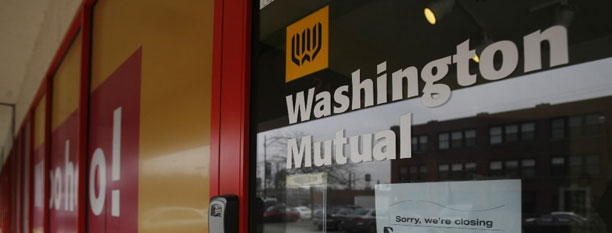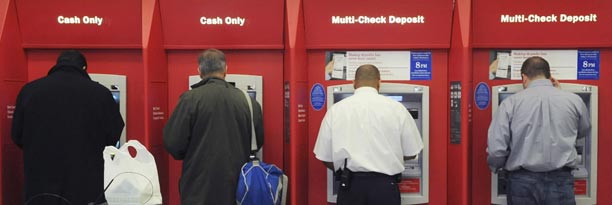March 18 at 10:38 a.m.
Filed under:
Banking
By Reuters
JPMorgan Chase & Co, Wells Fargo & Co. and other major U.S. banks plan to boost their dividend payments after passing stress tests evaluated by the Federal Reserve.
The share buybacks signal that regulators view banks as being healthy enough to withstand the remaining uncertainties in the economy, after the banking system has been profitable for a year. Get the full story »
March 18 at 6:16 a.m.
Filed under:
Banking,
Economy
By Associated Press
Inflation spooked the nation in the early 1980s. It surged and kept rising until it topped 13 percent. These days, inflation is much lower. Yet to many Americans, it feels worse now. And for a good reason: Their income has been even flatter than inflation.
Back in the ‘80’s, the money people made typically more than made up for high inflation. In 1981, banks would pay nearly 16 percent on a six-month CD. And workers typically got pay raises to match their higher living costs. No more. Get the full story »
March 17 at 5:21 p.m.
Filed under:
Bank failures,
Banking,
Investigations
By Reuters

A Washington Mutual branch at 2053 N. Clybourn that closed in 2008. (Candice C. Cusic/Chicago Tribune)
A U.S. government regulator sued Kerry Killinger and two other Washington Mutual Bank executives accused of pioneering reckless home loans that led to biggest bank failure in U.S. history.
The three “gambled billions of dollars of WaMu’s money” by rewarding employees and themselves for pushing risky, low-teaser rates loans while ignoring warnings about the housing bubble, the Federal Deposit Insurance Corp said in its lawsuit. Get the full story »
March 17 at 1:04 p.m.
Filed under:
Bank failures,
Banking,
Litigation
By Dow Jones Newswires-Wall Street Journal
The Federal Deposit Insurance Corp. sued three former executives of the failed Washington Mutual Bank, along with two of their wives, in a lawsuit filed on Wednesday.
The FDIC is seeking $900 million in damages, charging gross negligence and other failures by the former executives in the run up to WaMu’s collapse in September 2008, the largest U.S. banking failure. Get the full story »
March 17 at 5:53 a.m.
Filed under:
Bank failures,
Banking
By Dow Jones Newswires-Wall Street Journal
U.S. banking regulators have paid out nearly $9 billion to cover losses on loans and other assets at 165 failed institutions that were sold to stronger companies during the financial crisis. Get the full story »
March 16 at 2:13 p.m.
Filed under:
Banking
By Becky Yerak
Glenview State Bank, a $1.1 billion-asset bank, will hold four free shredding days for the public to dispose of up to 25 pounds of cancelled checks and other documents that are no longer needed or wanted.
Drive-through service will be provided with three 12,000-pound-capacity industrial shredding trucks on site for the first event, from 9 a.m. to noon on April 9 at the bank’s main office at 800 Waukegan Rd., Glenview. Get the full story »
March 16 at 2:02 p.m.
Filed under:
Banking,
Government
By Becky Yerak
Nearly 150 U.S. banks, including Princeton National Bancorp, failed to pay a Feb. 15 dividend on bailout money borrowed from the U.S. Treasury. That’s up from the 123 that skipped their payouts in November.
The study by SNL Financial, tracker of banking industry data, showed that 142 U.S. lenders deferred the dividend payment due under the Troubled Asset Relief Program, or TARP. Get the full story »
March 16 at 6:08 a.m.
Filed under:
Autos,
Banking,
Government,
Insurance
By Associated Press
The government’s bailout of banks, auto makers and insurers helped prevent a more severe economic crisis, but might have sowed the seeds of the next one, a congressional watchdog group said Wednesday in its final report.
The Congressional Oversight Panel said that the government’s rescue fund may have prevented an economic depression by sending billions of dollars to companies crippled in financial crisis that erupted in 2008. But little has been done to aid to homeowners facing foreclosure or others far from Wall Street, it said. Get the full story »
March 16 at 5:41 a.m.
Filed under:
Banking
By Dow Jones Newswires

Customers use ATMs at a Bank of America branch in Boston. (AP Photo/Lisa Poole)
Some of the nation’s biggest banks are imposing a variety of new fees on people who withdraw money from automated-teller machines.
The move is the latest example of the burgeoning new fees that banks are imposing on customers accustomed to years of free services. Banks are scrambling to replace billions of dollars in revenue expected to be lost from new federal regulations on overdraft charges and debit cards. Get the full story »
March 15 at 5:34 p.m.
Filed under:
Banking,
Government
By Dow Jones Newswires
Sen. Jon Tester (D-Mont.) and a bipartisan group of U.S. senators on Tuesday formally launched their legislative attack on the Federal Reserve’s plan to regulate debit-card transaction fees, a move cheered by banks and credit unions but slammed by retailers.
The bill, dubbed the Debit Interchange Fee Study Act, comes amid mounting concerns over the Fed’s proposed fee caps and calls for a two-year time out on the regulation. Get the full story »
March 15 at 1:27 p.m.
Filed under:
Banking,
Economy,
Government
By Associated Press
The Federal Reserve is sticking with its $600 billion Treasury bond-purchase program to strengthen the economy as Japan’s nuclear crisis raises worries around the globe. Get the full story »
March 15 at 10:59 a.m.
Filed under:
Banking,
Bankruptcy,
Government
By Reuters
Creditors who help authorities liquidate a troubled financial firm would be among those paid off first among unsecured creditors, according to a proposal issued by the Federal Deposit Insurance Corp.
Bank and financial services groups have complained that more clarity is needed about how unsecured creditors will be treated under the U.S. government’s new authority to seize large, failing companies. Get the full story »
March 15 at 10:27 a.m.
Filed under:
Banking
By Reuters
Swiss bank UBS said it had received subpoenas from U.S. and Japanese regulators regarding whether it made “improper attempts” to manipulate LIBOR rates, the benchmark price for interbank borrowing costs.
“UBS understands that the investigations focus on whether there were improper attempts by UBS, either acting on its own or together with others, to manipulate LIBOR rates at certain times,” the bank said in its annual report Tuesday. Get the full story »
March 14 at 4:56 p.m.
Filed under:
Banking
By Becky Yerak
Silicon Valley Bank has hired John Hoesley, a board member of the Illinois Venture Capital Association, to run its Midwest private equity and venture capital services group in Chicago. Get the full story »
March 14 at 1:46 p.m.
Filed under:
Banking,
Chicago executives
Crain’s Chicago Business | Frederick Waddell, chairman and chief executive of Northern Trust Co., received $12.8 million in total compensation last year, according a proxy filing with the Securities and Exchange Commission. The 8 percent increase, attributed largely to pension contributions, comes as the bank’s performance lagged that of its peers.






